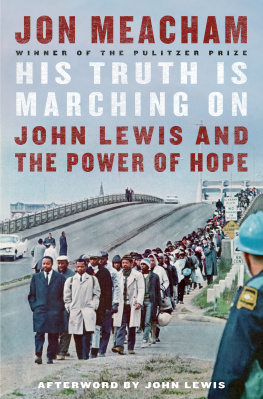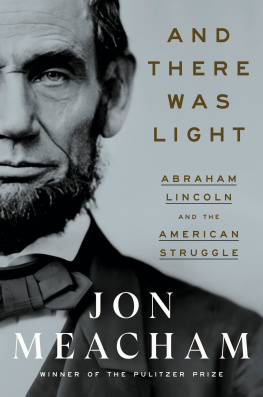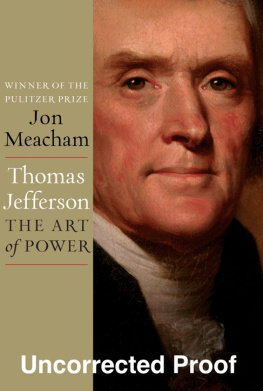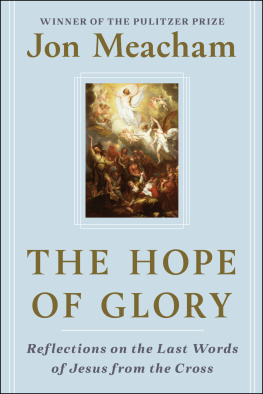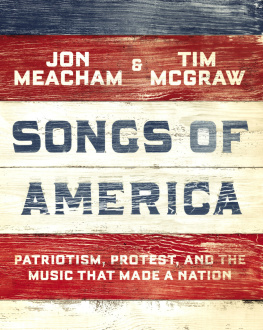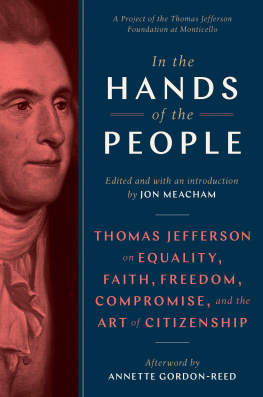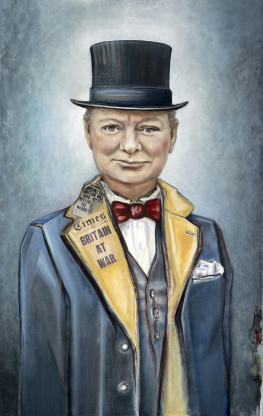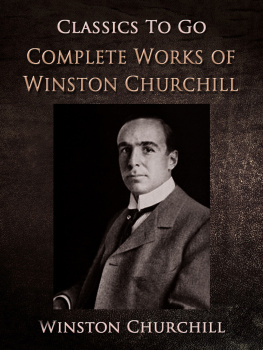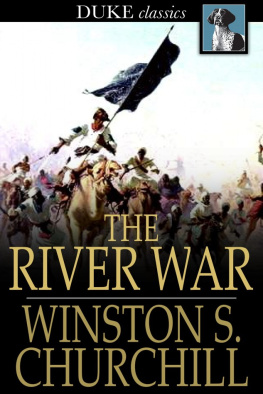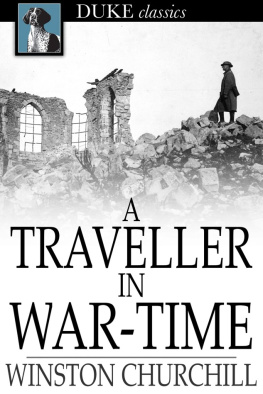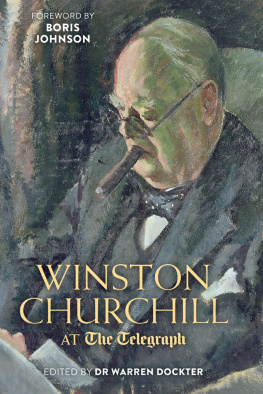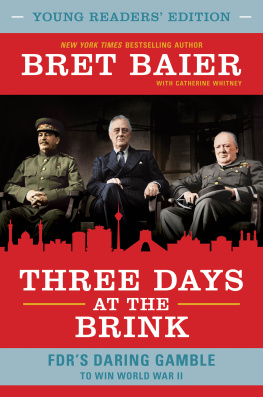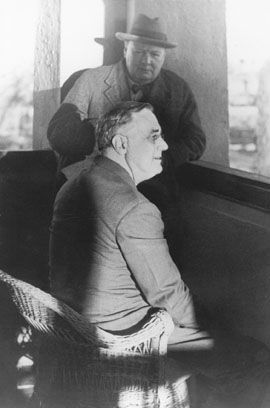
The greatest man I have ever known
Churchill and Roosevelt atop the tower at the La Saadia villa in Marrakech, January 24, 1943
CONTENTS
Beginnings to Late Fall 1941
Two Lions Roaring at the Same Time
A Disappointing Early EncounterTheir Lives Down the YearsThe Coming of World War II
Those Bloody Yankees
Roosevelts Letter of September 11Churchills Anguished Pleas for HelpAn Elusive AmericaBritain Alone
Jesus Christ! What a Man!
A Mission to LondonChurchill Courts HopkinsSail On, O Ship of State
Lunching Alone Broke the Ice
A Secret Meeting at SeaChurchill and Roosevelt Hit It OffAmerica Enters the War
Winter 1941 to Late Summer 1943
A Couple of Emperors
A White House HolidayChurchills Heart ScareAn Embarrassing Telephone Call
I Think of You Often
Churchill Faces a Storm at HomeFamily DramasRoosevelt Comforts ChurchillA Sunday Morning in the Oval Study
You May Kiss My Hand
Eleanor Roosevelt Calls on the ChurchillsRendezvous at CasablancaA Sunset at the Pinnacle
I Know He Means to Meet Stalin
A Letter from Lucy RutherfurdRoosevelts Secret Overture to MoscowFishing at Shangri-laA Moonlit Drive
Fall 1943 to the End
I Had to Do Something Desperate
A Makeshift ThanksgivingTough Times in TeheranRoosevelt Turns on Churchill
The Hour Was Now Striking
Both Men Battle Their MortalityTension and Triumph on D-DayA Fight over the Next Front
Life Is Not Very Easy
Churchill Worries About Roosevelts ReelectionStalin and Churchill in MoscowRoosevelts Global VisionIts in the Bag
I Saw WSC to Say Goodbye
The Meeting at YaltaRoosevelt and Churchill PartALovers QuarrelThe President Goes to Warm Springs
You Know How This Will Hit Me
The Last LettersI Had a True Affection for FranklinChurchill in Winter
TO KEITH
The future is unknowable,
but the past should give us hope.
WINSTON CHURCHILL
FRANKLIN
AND
WINSTON
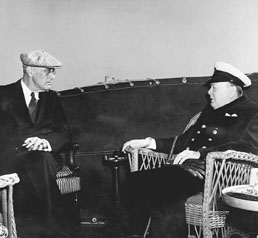
My thoughts are always with you all
Aboard the USS Quincy at Malta, February 2, 1945
INTRODUCTION
A Fortunate Friendship
THE LIGHT WAS fading. Late on the afternoon of Sunday, February 4, 1945, in the Crimean coastal town of Yalta, the three most powerful men in the worldFranklin Delano Roosevelt, Winston Churchill, and Joseph Stalinwere sitting in the Grand Ballroom of the Livadia Palace, a former summerhouse of the Russian czars. The Allies in the war against Adolf Hitlers Germany were three months and four days away from conquering the Third Reich; Imperial Japan would surrender three months after that. There were huge questions to be decided about the wars final act and its aftermath, yet Churchills circle was horrified by the paralyzed Roosevelts condition. He is very thin & his face is drawn & deeply lined & he looks weary all the time and as if he might be in bad pain, British Air Chief Marshal Charles Portal wrote to Pamela Churchill, then Churchills daughter-in-law. Also, his brain is obviously not what it was. Altogether he looks as if Truman might be in for a job of work, but of course it may be nothing serious though none of us liked the look of it much. It was quite serious: The American president was secretly suffering from congestive heart failure and high blood pressure. The prospect of losing Roosevelt troubled Churchill, who had spent five years in a turbulent but intimate alliance with the president. Our friendship, Churchill told Roosevelt in the early months of 1945, is the rock on which I build for the future of the world so long as I am one of the builders.
Roosevelt veered between engagement and exhaustion. Hes really absolutely sweetvery easy to make conversation toamusing & generally in great form, Kathleen Harriman, the daughter of the American diplomat Averell Harriman, told Pamela in a letter from Yalta. But Roosevelt could not escape the shadows. Writing to Pamela about Roosevelt, Churchill, and Uncle Joe Stalin, Portal said: I am sure that FDR is completely unable to think hard about anything. He is tremendously perceptive of an atmosphere, and the most wonderful politician, but on these occasions where he meets W & U.J. he is absolutely pathetic. It is such a pity, but I suppose everyone fails in one way or another.
Churchill, however, had spent so much time and invested so much of himself in maintaining a connection with the president that he could not quite contemplate life after Roosevelt. Cabling Roosevelt from London as Germany tottered after Yalta, Churchill was nostalgic. I remember the part our personal relations have played in the advance of the world cause now nearing its first military goal, he wrote, adding that he and his wife, Clementine, were looking forward to seeing the president and Eleanor Roosevelt in England soon. My thoughts, Churchill said, are always with you all.
But there was nothing he could do. Roosevelt was dying. One of the great friendships in history was coming to an end.
TO MEET ROOSEVELT the president, with all his buoyant sparkle, his iridescence, Churchill once said, was like opening a bottle of champagne. Theirs was an extraordinary comradeship, forged, as Churchill put it to Eleanor Roosevelt the day the president died, in the fire of war. Between September 11, 1939, and April 11, 1945 (the eve of Roosevelts death), the two carried on a correspondence that produced nearly two thousand letters. From the USS Augusta in Placentia Bay off Newfoundland in August 1941 to the USS Quincy off Alexandria, Egypt, in February 1945, they spent a hundred and thirteen days together. By wars end Roosevelt and Churchill would celebrate Thanksgiving, Christmas, and New Years in each others company, visit Hyde Park and Shangri-la (the retreat in Marylands Catoctin Mountains that President Eisenhower rechristened Camp David) together, and once slip away from the press of business to spend a brief holiday in Marrakech, where Roosevelt was carried to the top of a tower to see the rays of the setting sun reflect off the snowcapped Atlas Mountains. An accomplished artist, Churchill painted the view for Rooseveltthe only picture Churchill produced during the war. The spring that Roosevelt died he was planning a state visit to Britain.
Reflecting on her father and Roosevelt, Mary Soames, Winston and Clementine Churchills youngest and last surviving child, captured the complexities of the relationship by quoting a French proverb: In love, there is always one who kisses, and one who offers the cheek. Churchill was the suitor, Roosevelt the elusive quarry. Their friendship mirrored their private characters. With Roosevelt, Churchill was sentimental and shrewd. With Churchill, Roosevelt was cheerful and calculating. Churchill was warmer and more anxious for reassurances about Roosevelts affection for him; Roosevelt cooler and more confident, alternately charming and distant.


